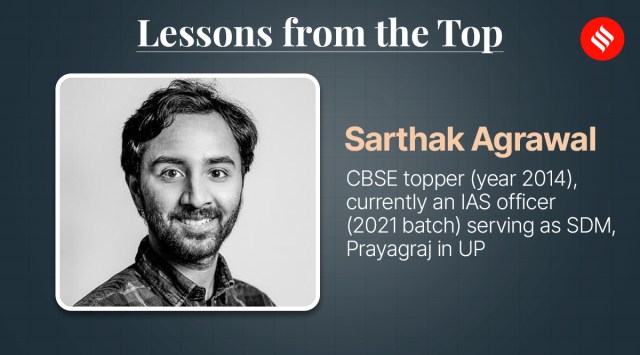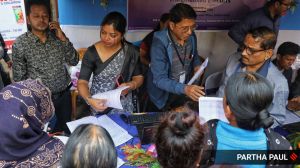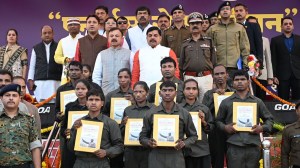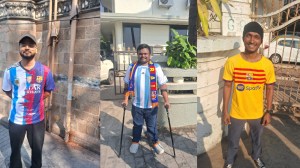Meet CBSE 2014 Class 12 topper Sarthak Agrawal who cracked UPSC CSE to join IAS
"If I look back at the person I was in 2014, I wouldn’t recognise myself. I am more mature and balanced now... My worldview has evolved too. I placed a higher weight on examinations back then. Now, I know better," says Sarthak Agrawal.
 Sarthak Agarwal has last year cracked UPSC CSE. (Graphic by Abhishek Mitra)
Sarthak Agarwal has last year cracked UPSC CSE. (Graphic by Abhishek Mitra) (In our new series ‘Lessons from the Top‘, which we are starting in the run-up to the CBSE and ISC results expected this month, we have featured interviews with four toppers who graduated from high school a decade ago. Among them, one currently works as a scientist at Amazon in the US, another is a principal architect at Adobe in California, the third is a student at Harvard Law School, and the fourth is serving as an IAS officer and SDM of Prayagraj district in Uttar Pradesh. They share insights into their experiences with schooling, work, personal journeys, and life so far).
Sarthak Agrawal (26), a student of Delhi Public School, Vasant Kunj, scored 99.6% in science in 2014 and topped the CBSE Board exams that year. He then went to Shri Ram College of Commerce, Delhi University, for a BA in Economics (2014-17) and later to Oxford University for an MPhil (2017-19) in the same subject. He cracked the civil services exam on the first attempt and secured All-India Rank 17. He’s currently posted as Sub Divisional Magistrate in Prayagraj in Uttar Pradesh.
Q. What’s the best thing about your work?
I get to serve society, especially the least fortunate, and get an opportunity to make our government more citizen-centric and responsive. I also have the power to drive and sustain outcomes in diverse sectors like health, education, and livelihoods.
Q. What are the habits from school or college life that have stood you in good stead?
Reading widely and deeply, having high ambitions and wanting to stand out, and developing cross-cutting professional networks. Most of these are from college, I must add – in school, I couldn’t bother about any of these…
Q. In hindsight, one thing you wish you had done differently in school or college or life?
Maybe picking up some more skills and hobbies, like playing a musical instrument (I wish I knew how to play the violin, for instance). Also, remaining in touch with a wider set of people. Right now, I am close to the people I spent most of my time in school and college with but practically nobody else. In sum, trying to get out of my comfort zone more often.
Q. What are the two things that helped you top the CBSE board exam?
Topping an exam is mostly a case of good fortune. But there are strategies to do well. As my Physics teacher in school, Vivek sir, once told me, learning a subject and doing well in the exam are (unfortunately) two different things. To ace an exam, one usually spends a lot of time understanding its structure, the kind of questions that are usually asked, and the type of answers that examiners expect. Most of this is unproductive labour from the point of view of understanding a topic in depth.
One should balance these two objectives (and exam setters should try to bring them together). Second, there is no substitute for ambition. It is hard to do very well without desperately wanting to.
However, Vivek Sir and I would disagree on this. He would often tell me that one must not think too much about the outcomes. He once asked me: “If Sachin Tendulkar stepped into the ground wanting to score a 100 in every match, how much pressure would he put himself in? Do you think he would be able to make a single run?”
Closely related to this is innovation. Before jumping into anything, I would think long and hard about my comparative advantage and how to harness it. For instance, if I possess a deep conceptual understanding of a topic, how do I convey this to the examiner? It may mean writing longer answers, which implies that I will need to ace my time management skills. So, I would work extra hard on that.
Q. What kind of doors opened for you after being a national ranker?
I could study at the college of my choice, which provided excellent opportunities for professional and personal development. It may have helped me secure a scholarship for higher studies at Oxford University.
The achievement made me more self-confident and ambitious. It also set in motion a certain kind of delusion that nothing is off-limits. I have failed several times after Class 12 but never once did I consider myself unworthy or a failure.
Friends and family started expecting more from me. So did I. But one small mindset helped me not to remain stuck in past glory. I made a promise to myself when I entered SRCC that my biggest professional or academic achievement three years later should not be my class 12 result.
Q. How different are you from the person who topped the exam several years ago?
If I look back at the person I was in 2014, I wouldn’t recognise myself. I am (much) more mature and balanced now. Not sure if that is a function of age or exposure. My worldview has evolved too. I placed a higher weight on examinations back then. Now, I know better. The kind of things that interest me – politics, cricket, economics, international affairs, and travelling – have changed.
Or perhaps, I would find that nothing has changed because I am still the eager, excited, and prone-to-procrastination kid, who instead of grappling with a tough problem would be only too happy to circle it and move on to the next one (and never come back).
Q. What is the one thing you would wish to change about your school education?
There are many. Champion innovation and creativity. Incentivise students to come up with interesting and novel ideas, and normalise failure. Encourage them to think critically and question all received wisdom. Increase focus on practical learning, especially in subjects like science. Expose students to well-equipped laboratories from an early age and allow them to perform experiments.
Make examinations more conceptual. Prioritise depth over breadth in higher classes and move away from rigid marking schemes. Reduce the heterogeneity in school/teacher quality. Encourage kids of senior grades in well-performing schools to devote some time teaching children in low-capacity ones. Imbibe a spirit of service in them (my school motto – service before self – is a great idea to propagate).
Boards should seriously consider the idea of grade disinflation. A grade of 100 in subjects such as English and History should be reserved only for those students who have demonstrated exceptional excellence and creativity.
- 01
- 02
- 03
- 04
- 05































